Saturday Feb 21, 2026
Saturday Feb 21, 2026
Saturday, 3 September 2022 00:00 - - {{hitsCtrl.values.hits}}

By Surya Vishwa
Veteran engineer and promoter of renewable energy in Sri Lanka, Parakrama Jayasinghe, a member of the technical committee of the All Ceylon Buddhist Congress (ACBC), did not mince his words when he stated last Wednesday that all what Sri Lanka has done for the past 74 years is to strengthen the economy of other countries. This is by purchasing their fossil fuel at exorbitant costs, while ignoring the renewable energy this nation has in utmost abundance.
Renewable energy refers to green energy i.e. energy produced using non-harmful methods to the planet, by tapping onto the bounty of nature that includes the sun (solar), water bases (hydro), wind, greenery (dendro) and domestic kitchen or garden refuse based energy (bio gas).
In combination of varying proportions as practically available, these renewable and sustainable green energy could empower each household of Sri Lanka to become energy independent and thus end the saga of needless and irrational beggary, Eng. Parakrama Jayasinghe explained, speaking as an ACBC renewable energy panel member that addressed the media last week.
The point that Sri Lanka’s long-term non-focus on energy self-sufficiency has cost the nation heavily and that this need not continue in the years to come, was one of the key messages that the All Ceylon Buddhist Congress (ACBC), one of Sri Lankas’s apex national institutions imparted to the nation at Wednesday’s press briefing to announce the exhibition and forum related to renewable energy. The event is scheduled to be held on 11 and 12 September at the ACBC premises. Among the audience the event hopes to attract are children and youth of the country as well as the entrepreneurial community and average citizens.
The ACBC panel of renewable energy experts, addressing the media explained that any nation which wants to become economically stable would first secure its energy sources and invest in it.
The organisation’s focus on renewable energy is taken up by the technical committee set up three years ago to concentrate on vital sectors connected to the development of Sri Lanka and the Buddhist ethic that cuts across many segments connected to the macro framework of the country.
The exhibition of innovation connected to renewable energy is organised by ACBC in collaboration with institutions such as the Inventors Commission of Sri Lanka, the Bank of Ceylon and the Sustainable Energy Authority. The ACBC will also be working with institutions such as the National Engineering Research and Development Centre (NERD), Industrial Technology Institute (ITI), the Arthur C. Clarke Centre, the Vidatha Resource Centre and national universities, to make the renewable energy sufficiency a reality.
As part of its commitment and campaign launched three months ago to promote, research and educate the public on renewable energy in Sri Lanka, and carry out diverse practical projects in this regard, the Weekend FT and the Harmony page is supporting the ACBC endeavour as part of its goal to mainstream awareness on earth-friendly energy options.
“The stalls to be set up at the ACBC premises are made available free for inventors and entrepreneurs who want to showcase their work connected to sustainable energy,” Dr. Harsha Wijewardena, Head of the Technical Committee of the ACBC and board member of the BOC stated.
The BOC commenced from 1 August commemorating its 83rd anniversary, the provision of different forms of loan assistance to facilitate households and industries to adapt to nature based energy. A loan totalling to Rs. 150,000 is provided to households to set up biogas units, while larger amounts are provided to shift to other forms of renewable energy, especially solar.
The main goal of the BOC and the Inventors Commission in joining with the ACBC in promoting invention and innovation to boost renewable energy is to be able to directly influence the national economy in the short and long term by introducing green energy based inventions as marketable and high demand items that could enter the local market in mass scale. The route envisaged is to tap the micro economic potential of every single household becoming renewable energy savvy and thereby becoming an energy consumer as well as a producer.
“There is a great synergy when institutions and people get together for a common cause. The inventors’ commission has worked previously with the ACBC to promote innovation. Right now we at the inventors’ commission have accelerated our work to encourage invention in respect to renewable energy,” Nalin Dolawatte, Director at the Inventors Commission who has done yeoman service in planning the September invention exhibition told the Weekend FT in an interview. He especially cited the work being done with school inventors clubs across the country.
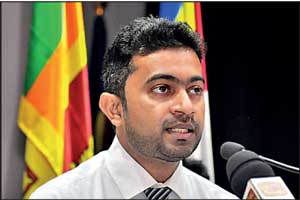 Dr. Anupa Herath, Assistant Commissioner and a young medical related inventor himself told journalists that the selection of the inventions to be exhibited is in progress. The inventors’ commission has so far received around 500 applications from inventors around the country in response to the call for exhibitors for the ACBC event.
Dr. Anupa Herath, Assistant Commissioner and a young medical related inventor himself told journalists that the selection of the inventions to be exhibited is in progress. The inventors’ commission has so far received around 500 applications from inventors around the country in response to the call for exhibitors for the ACBC event.
A full interview with the Inventors Commissioner, N.M.S. Sirimuthu who is Professor in the Department of Chemistry of the University of Sri Jayewardenepura is to be carried in this page in the upcoming editions, focusing on diverse aspects including policy-related matters pertaining to inventions in Sri Lanka.
“Inventions carried out in a nation should be encouraged as well as integrated to national requirements and the mainstream economy. This is what the ACBC has contemplated upon in the current context of Sri Lanka where much of the economic hardship is based on the country not using its renewable natural energy resources,” President of the ACBC, Chandra Nimal Wakishta (retd. DIG) stated.
Addressing the media he explained that the potentially five-year goal of the ACBC is to ensure that every roof in the country is connected to solar energy and where each household can sell the excess energy it has generated to the CEB. The purpose of the two day September event is to start creating a foundation for invention especially in the minds of the younger generation where the full scope of all forms of renewable energy could be explored, he stated.
A point emphasised by him was that the All Ceylon Buddhist Congress (ACBC) functions with a humanistic mindset for all Sri Lankans irrespective of ethnicity or religion.
The ACBC renewable energy panel meanwhile noted that the global financial potential of carbon credits that the country could generate has not been fathomed by Sri Lanka comprehensively. Carbon credits are accorded as a means of encouraging reduction of carbon dioxide from industrial productions and is a potential source of earning for nations.
A key obstacle for renewable energy transition in Sri Lanka was cited as the main grid limitation in accommodating non fossil energy generation. It was pointed out that some mechanisms are being systematically thought out in this regard.
There are diverse unseen or un-researched major economic fallouts that the current fossil energy dependent fuel crisis is creating and one is that many companies located in Sri Lanka, especially IT companies are relocating elsewhere in the world.
Below are the full comments the Harmony page obtained, in detailed interviews with some of the ACBC members:
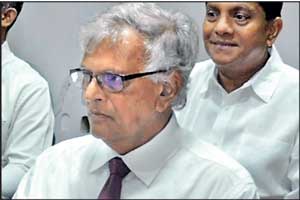 Eng. Parakrama Jayasinghe, ACBC Technical Committee Member and expert on renewable energy:
Eng. Parakrama Jayasinghe, ACBC Technical Committee Member and expert on renewable energy:
“What we have as a fuel crisis today is a preventable one. The solution is that we have to create each energy consumer to be an energy producer as well. We have to look for alternatives to this fossil fuel dependency which is draining our dollars. Affordable and clean energy is the seventh sustainable development goal among the seventeen related goals and is interconnected and relevant to all other categories mentioned. What we have to do is educate people and encourage indigenous solutions however small that will look at fulfilling domestic energy requirements. Solar and bio gas options we could promote as part of a gamut of indigenous alternatives. So far we can see many rural entrepreneurs making processed wood/charcoal earthen cooking ware and there are those who are inventing with bio gas. This trend has to be kept up with.
Our renewable energy solution should be aimed at creating economic independence. Small endeavours go a long way. Not just one massive foreign investment based option where the foremost financial benefit could elude us. While we should tap foreign investment it should be with a very precise and transparent plan for Sri Lanka to benefit from it and not just sell out our natural resources and buy the energy at exorbitant costs. There are a whole lot of local investors that we could tap if we spread out our solutions across the country to be a network of small initiatives.”
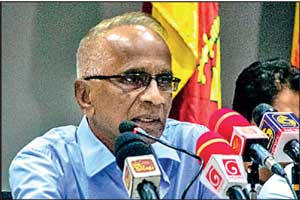 Dr. L.M. Keerthi Tillekeratne, Vice President – All Ceylon Buddhist Congress and former Inventors’ Commissioner (2000 to 2008):
Dr. L.M. Keerthi Tillekeratne, Vice President – All Ceylon Buddhist Congress and former Inventors’ Commissioner (2000 to 2008):
The objective of organising the exhibition of inventions and entrepreneurship pertaining to renewable energy jointly with the Sri Lanka Inventors Commission, BOC, the Vidatha Centre and other related institutes is to encourage Sri Lankans, especially the youth to start export-oriented businesses making use of the highest quality industrial raw materials available in the country. Our resources such as Graphite and Ilmenite (titanium) are exported cheaply now as raw materials. With adequate research and development these can be made into high priced finished products to earn foreign exchange badly needed by Sri Lanka.
Inventors and entrepreneurs selected from this exhibition by the business arm of the ACBC will be provided with the technical knowhow needed and support for bank loan facilitation through BOC arranged.
The ACBC in collaboration with the relevant institutions will provide quality control facilities for the products produced to meet international quality standards and assist in arranging overseas markets where possible.
We hope to work with a long-term objective with the education sector of the country to promote the creativity of children that could lead to useful inventions. Throughout the time when I served as inventors’ commissioner, the best and most outstanding innovations were from children in remote areas who created solutions for everyday problems they witnessed.
One classic example was an innovation made by a grade five student in a remote corn growing village in Anuradhapura. What was created was a small machine to clean up corn. The father was a mechanic in a cycle shop and this child grew up amidst nuts and bolts. One of the problems the corn growers had in that village was that they could not sell the corn to food industrialists because the crude methods they used by putting the corn in gunny bags and smashing it up produced toxicity which was not accepted by buyers. This child knew this and created a near perfect contraption which cleaned up the corn without hassle.
Under my direction assistance was obtained to improve the device and the product was introduced to the market and the child and the family received the money per item sold. There are many child and youth innovators like this in each village. It is our task to search them out and ensure their ideas are not stolen but encouraged and perfected. Having a university PhD or paper qualifications do not create innovators. Rote learning, cramming and exam taking do not create innovators. Curiosity, creativity, nature based activities and practical thinking create inventors and innovators. Most of the time our education system kills all these and produces creative dead persons and this is a serious national problem.”
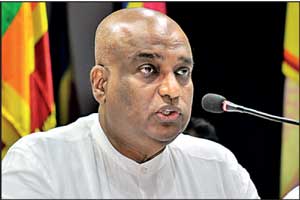 Chandra Nimal Wakishta, President – All Ceylon Buddhist Congress (ACBC):
Chandra Nimal Wakishta, President – All Ceylon Buddhist Congress (ACBC):
“Sri Lanka was called paradise by ancient visitors. This is a resplendent paradise but often we do not seem to be conscious of it. This is not a country that has to be indebted to others. We have to ensure that we stop neglecting the natural and human resources of this nation. We need to create public awareness of a very high scale on the natural energy resources that are available amply in this country. The first step of creating this awareness is what the ACBC is carrying out with the invention related exhibition held this month. The All Ceylon Buddhist Congress conducts its activities for the benefit of all Sri Lankans and not just any specific community or religion and all our projects emphasise the wisdom and humanity of Buddhism.”
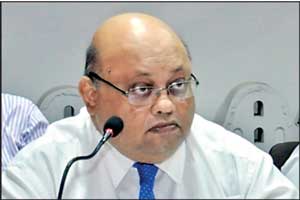 Dr. Harsha Wijewardena, IT specialist and head of the technical committee of the ACBC:
Dr. Harsha Wijewardena, IT specialist and head of the technical committee of the ACBC:
“IT companies and other industries are leaving Sri Lanka and locating themselves elsewhere on account of the power outages. This impacts the economy in a drastic way. Businesses are closing because of the energy crisis. Fitting renewable energy options into the main grid has to be looked into and we are trying to come up with practical solutions. The ACBC event is not about an overnight answer to these challenges but rather the beginning of a consistent effort to connect all those who are working in this regard. Overall, there is much to be done about finance based assistance to encourage renewable energy on a mass scale basis and for this the Bank of Ceylon (BOC) has initiated several loan schemes. The ACBC hopes to work continually with many organisations and institutions to commit to the cause of renewable energy in diverse ways and we ask the media to carry forward the mission of creating awareness on the potential of renewable energy.”
Pix by Lasantha Kumara